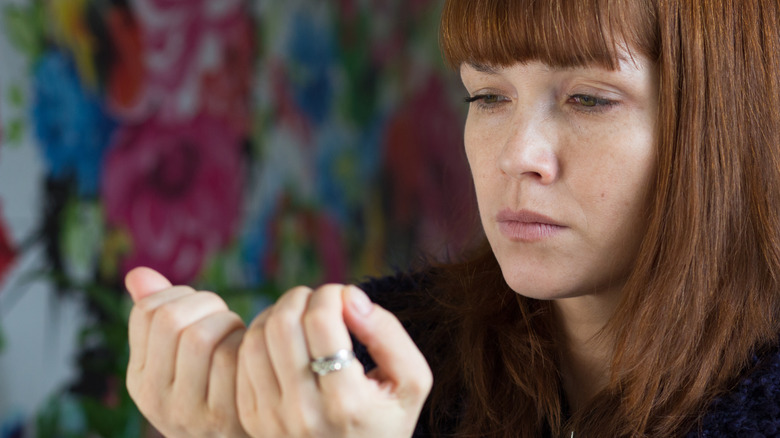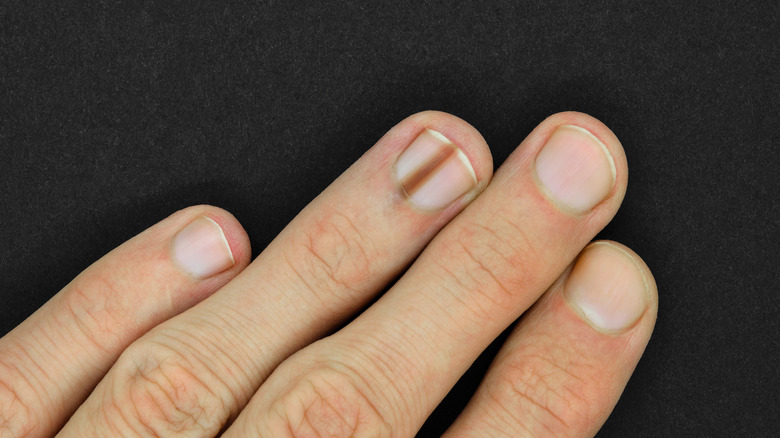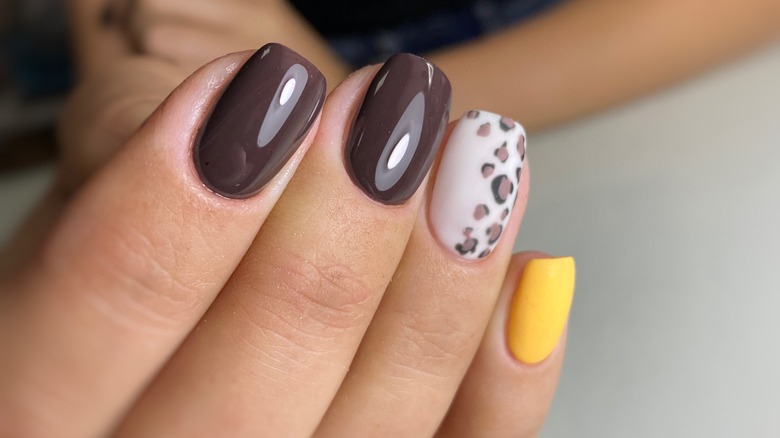What's Causing Black Lines To Appear On Your Nails?
Our nails often take a secondary position in bodily care. While our daily self-care might involve moisturizing skin and washing our hair, nail care is not something we pay a lot of attention to. Unless of course we're scrolling through TikTok and see some nail color trends we must absolutely have. They could be gel manicures or nail art, it doesn't matter. Taking a few hours off your day to visit the salon for some nail-related TLC can feel wonderful.
Despite the fact that nails cross our minds only during manicures or when we have to clip them, most dermatologists would tell you that our nails are an important indicator of our overall health. This is why it's important that your nails be included in your yearly skin check too.
Minor changes in color and consistency of nails can be signs of something harmless or serious. The important thing is to notice them. Have you seen black lines appearing on your nails recently? Perhaps you're wondering what this is all about. Here are some possible causes.
Black lines can be a sign of trauma or a serious underlying health condition
Black or dark colored stripes along your nail bed can be caused by something like trauma to the nail and psoriasis or more serious concerns like melanoma, according to board-certified dermatologist and cosmetic surgeon Dr. Joel Schlessinger (via Scary Symptoms).
The most common cause for black lines to appear on your nails is splinter hemorrhages caused by trauma to the nail bed. Maybe you stubbed your toe without realizing it last night. Black lines can also be a sign of linear melanonychia which is a hereditary color variation that is prevalent commonly among people of African American origin, according to Medical News Today. Certain drugs and medical procedures like chemotherapy and conditions like lupus, HIV, scleroderma, endocarditis, nail fungus, kidney or lung disease, thyroid disease, diabetes, and syphilis can also cause dark streaks to appear on your nails.
Since the causes can vary from relatively harmless to potentially serious health concerns, it's always best to consult with a dermatologist if you're worried, especially if the dark lines don't go away with time. Your doctor might revisit your medical history and assess any other changes to your health along with the discoloration. While some conditions won't require treatment and will subside on their own, serious health issues like melanoma would likely necessitate surgery.
Good-looking nails require a whole lot more than nail polish
The benefits of proper nail care go beyond what you might think. Sure, you want your nails to look good, but you also want them to be healthy from the inside out. Some of the most common advice you'd get from dermatologists would be to not bite your nails, to trim your nails regularly, to leave your cuticles alone, and to not use your nails to open bottles. Other ways you can keep your nail bed healthy include moisturizing your cuticles with cuticle oil and protecting them from moisture and chemicals when you're using abrasive substances (think washing the dishes, cleaning the bathroom, or even using lots of hand sanitizer).
If you're one for nail polish, gel manicures, and nail art, it's important to understand the chemicals you're exposing your nails to as well. It's also crucial that you give your nails a break between beauty treatments.
Your diet plays a big role in the health of your nails too. Dermatologist and author Dr. Ava Shamban told HuffPost, "Nails are made out of protein, so the first thing you can try is adding more to your diet. Eat lean poultry, fish, beef and pork, as well as spinach and other vegetables that contain protein."


